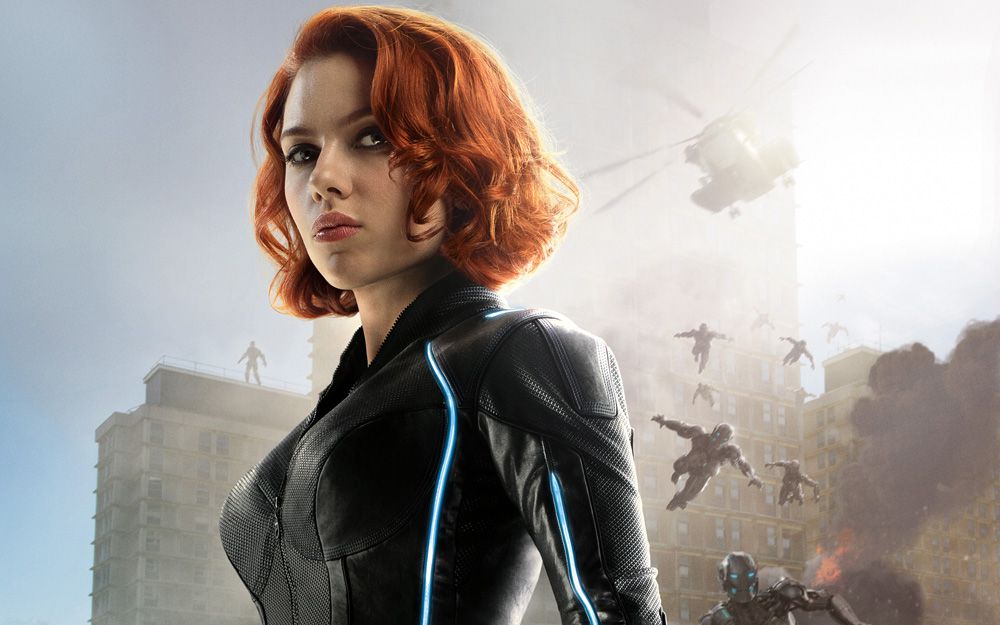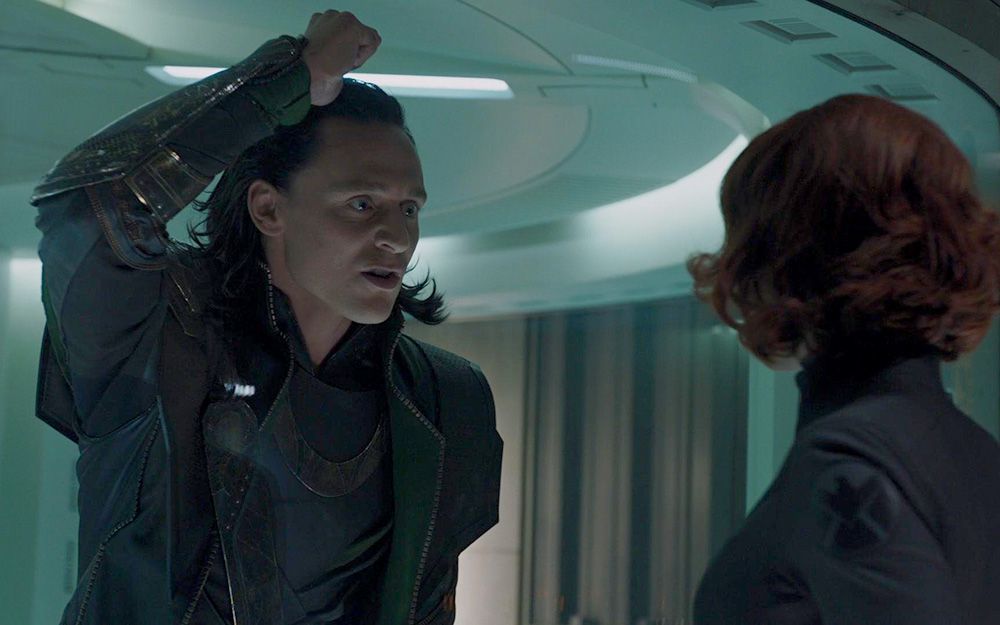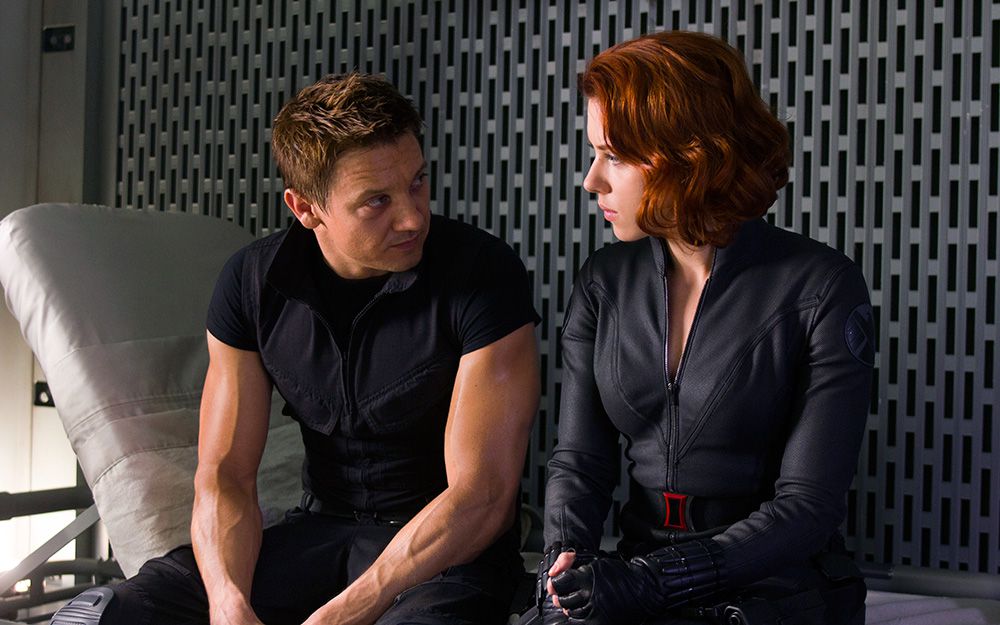Avengers: Age of Ultron and the Black Widow Controversy

Note: The following contains potential spoilers. Consider yourself warned.
I recently wrote about some potential controversy regarding the villain of Avengers: Age of Ultron, but a much larger controversy has been swirling around one of the movie’s heroes, Natasha Romanoff aka Black Widow (Scarlett Johansson), and how writer/director Joss Whedon treated her character. The backlash got so vitriolic that some theorized it was the reason for Whedon leaving Twitter (something he later denied).
For a good example of the criticism, read Meredith Woerner and Katharine Trendacosta’s “Black Widow: This Is Why We Can’t Have Nice Things.” Woerner and Trendacosta touch on several issues surrounding the character, beginning with her notable lack of presence — relative to her male teammates — in the movie’s marketing and merchandising.
The character isn’t even included with most Avengers toy sets, and has little to no presence on the shelves. The Mary Sue has a pretty eye-opening piece on the real reason that Disney’s toy arm had no interest in selling to girls: basically, they’re full up. “They already have the girls’ market on lockdown,” the piece explains. Great. Just great.
Woerner and Trendacosta aren’t the only ones who’ve noticed this disparity. Even Mark Ruffalo, who portrays Bruce Banner/The Incredible Hulk in the Marvel movies, has chimed in.
However, for Woerner and Trendacosta, the real travesty lies in how Black Widow’s backstory is treated in the movie. The crux of their complaint occurs during what is arguably Avengers: Age of Ultron’s most emotional scene. Throughout the movie, a romance has been building between Romanoff and Banner, one that she seems eager to pursue. Banner, however, is reluctant to reciprocate for fear of hurting Romanoff as the Hulk.
In an effort to dissuade her, he tells her he can’t have children; even having sex could be enough to trigger a Hulk rampage. “I can’t have this, any of this. There is no place on Earth I can go where I’m not a monster,” Banner protests. Romanoff dismisses Banner’s confession by revealing a painful secret of her own: As part of her assassin training, which included killing defenseless people (something we briefly see in a flashback), she was forced to undergo sterilization so that children couldn’t interfere with her missions. “You think you’re the only monster on the team?” she pointedly asks Banner.
Back to Woerner and Trendacosta:
That’s what the Red Room did to her. It’s not the loss of innocence through killing or being forced to live a life of betraying people. The greatest loss is motherhood. That’s why she’s a monster like the Hulk. Poor Black Widow. She leaned in, and where did it get her? She’s a lonely, incomplete, monster.
But it’s OK because The Avengers: Age of Ultron is going to give Black Widow a baby. A gigantic baby named The Hulk, and a brand new superhero power of “the lullaby.” Not a whisper or a song or a knock-out juice — a lullabye to coax her baby to sleep. This new power is trotted out over and over again, as if to say: Black Widow don’t be sad — you have a baby Hulk.
[…]
This blows. Instead of wading into the “red ledger” of a complicated person who did seriously heinous acts and is trying desperately to buy redemption with good deeds, we get the character who feels ruined by her barren womb. And even worse, the movie tries to fix it by infantilizing another character into her big baby.
[…]
Black Widow is barren and therefore dead inside. Poor, empty-nested Mommy Widow, who even loses her love interest and pseudo-baby in one fell swoop at the end of the movie. The Hulk vanishes, to have more solo adventures later. Meanwhile, Black Widow is what? Captain America’s number two in The Avengers: The New Class. Sigh.
There’s much in Woerner and Trendacosta’s critique that’s worth considering, particularly concerning the dearth of heroine presence in the Marvel Cinematic Universe. (Though that’s being ameliorated somewhat by a second season of Agent Carter, huzzah! But I digress…) However, their criticism regarding the Black Widow’s treatment in Avengers: Age of Ultron strikes me as somewhat misguided. To be fair, the Black Widow doesn’t have any scene as great as her interrogation scene with Loki in the first Avengers movie, but to say that she’s been almost entirely degraded in Avengers: Age of Ultron is a bit much.

Regarding the sterilization reveal, if all we had to go on was Romanoff’s dialog, then I think Woerner and Trendacosta’s critique would be more justified. However, within the context of the scene as a whole, which includes flashbacks revealing how she was dehumanized through brutal training, it’s something of a stretch to say that Romanoff considers herself a monster only because she’s barren. (We get more clues about the extent of her training earlier in the film, after the Scarlet Witch has toyed with her mind, as well as in an episode of Agent Carter.)
In fact, as Whedon himself puts it, a character like the Black Widow coming to terms with the loss of that particular aspect of her being would be quite tragic, even monstrous — which is what we see in the film.
I do think it’s something that disconnects her from life, from the life cycle …. Not everybody wants to have children. It’s very easy to say something that sounds old-fashioned and sexist. But the fact of the matter is that the ability to create life is extraordinary. And I think the idea that she doesn’t have that makes sense for someone to whom life for a long time didn’t mean very much, and to have that sort of come back and hit her emotionally in a way that she’s probably never admitted to herself, let alone to anyone else.
One more thing to keep in mind regarding this scene is that Whedon’s original cut of Avengers: Age of Ultron was nearly an hour longer than the theatrical release; not surprisingly, it’s pretty much a given that an extended edition of the film will be released on Blu-ray/DVD. It’ll be interesting to see what, if anything, was cut from Romanoff and Banner’s scene, and if that missing material will add some more nuance that placates the critics.
As for the quip about being “Captain America’s number two in The Avengers: The New Class,” have we forgotten about Captain America: The Winter Soldier so quickly? True, she wasn’t the titular character but she was absolutely instrumental in that movie to defending S.H.I.E.L.D. from Hydra, and to Cap’s success, and proved his equal more than once. (This, of course, doesn’t deny the fact that a standalone Black Widow movie would be pretty cool.)
The Washington Post’s Alyssa Rosenberg has also found the Black Widow critique wanting:
The tragedy of Natasha’s character isn’t that she’s been felled from her mission by her love for babies. It’s that her mentor (Julie Delpy) took something away from Natasha that didn’t have to be removed for her to be a hero. She could have been a lover and mother and friend and fighter all at once. That Natasha’s male compatriots aren’t asked to reconcile supposedly disparate parts of their personalities is their good fortune. That Natasha works so hard to do so is the measure of her heroism.
Rosenberg’s article also touches on something that a lot of the Black Widow critics seem to have overlooked in this brouhaha: Black Widow’s relationship with Clint Barton aka Hawkeye (Jeremy Renner). In the first Avengers movie, we get hints that they have a long, colorful history, and at one point, I could’ve sworn there were signs of something romantic between them.

However, in Avengers: Age of Ultron, we learn that Hawkeye in fact has a wife and kids, something nobody else knows… except Romanoff. But this doesn’t seem to alter Black Widow and Hawkeye’s relationship at all: here, you’ve got male and female characters who have a strong friendship filled with mutual respect, concern, and affection, but with zero romance or sexual tension. And as it turns out, that was Whedon’s intention all along.
I find strong bonds between men and women that aren’t sexual not only cool and useful, but very romantic in a broad sense. There’s a lot of hate from the Clintasha crowd. It was never my intention that they were an item. I thought what was awesome was two people who would lay down their lives for each other who are not trying to sleep with each other. People keep saying that doesn’t exist, that men and women can’t be friends unless blah, blah, blah, and I’m just like, “Oh shut up.”
It is indeed refreshing to see a male/female relationship that’s so equal, and it sets up one of the film’s best scenes, which Rosenberg describes in her article:
[A]s she and Clint weave through the ruins of Sokovia, they diffuse their nerves by talking about Clint’s latest idea for a home renovation, a plan to turn his dining room into a workspace for Laura. “You guys always eat in the kitchen anyway,” Natasha tells him, cool as the world is falling away beneath them. There’s a subtle but profound intimacy to the exchange: It’s proof of how well they know each other, how much comfort they take from each other, how well Natasha is integrated into Clint and Laura’s lives.
I would think that critics would find this particular revelation — that in Marvel’s world, men and women can truly be peers in the workplace (such as it is), that they can be comrades-in-arms and respect each other for their unique abilities and not feel threatened — something worth celebrating. However, that facet of Black Widow’s character is completely overlooked in Woerner and Trendacosta’s article, and doing so seems pretty dismissive of the character in its own way.